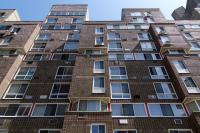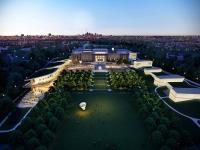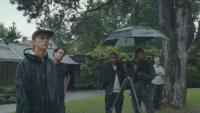Oshry Residence
Bel-Air, USA
Our first completed ground-up residential design, the Oshry House is a unique two-story “compound” built on a narrow lot at the edge of a Bel Air canyon. The product of our client’s ambitious vision and such fraught site conditions that even now still cause us to mutter in disbelief, our work on this home was both an invaluable learning experience, and when all was said a done, represents a truly auspicious start.
Sited on a steep Bel Air hillside and with full views of the Santa Monica Mountains and the Stone Canyon Reservoir, the lot we had to work with on this project was beautiful—and also borderline unbuildable. A narrow, steep grade and early soil testing revealed that the land was not fit for residential development with a standard foundation; due to the soil’s instability, we were required to root the structure with concrete friction piles dug 90-feet below the surface.
The client, Scott Oshry, envisioned a home with a strict delineation between public and private space, and in our early diagrammatic explorations, we discovered that this programming request could be particularly conducive to the site limitations. Our solution made great use of both realities: a narrow, linear plan, raised and split at the middle, connecting two distinct (public v. private) two-story blocks with a glass bridge over an unenclosed courtyard. The benefits to this plan were two-fold: in elevating and separating the quarters we were able to fully create a tangible boundary between private and public areas, and by incorporating this outdoor area as livable space minimizes the number of foundation piles needed for a sound structure.
The two-tower/courtyard configuration gives the home a compound-like feel, emphasizing the division of space while prioritizing the natural movements of light, air, and people. We carefully diagrammed and analyzed different orientations and presumed movement patterns, fine-tuning an intuitive living arrangement that maximizes comfort and the constant and thorough engagement with nature.
Located at the northern end of the home are the main living quarters. The kitchen, dining and sitting room sit on the ground floor, each space flowing naturally into the next; a large master suite and private terrace a level above. All of these spaces face southeast, oriented towards the canyon, framing a constant view that subtly changes as one moves throughout the home. The southern wing contains two guest bedrooms, an exercise room, the garage, and a second-story study overlooking the courtyard.
Open staircases link the two levels on both sides, which are of course then connected by what became the project’s defining feature: the steel-framed glass bridge.
Architectural Digest, in writing about the Oshry in 2003, dubbed the bridge the homes “most transcendent feature: a glass corridor that pretends to be about utility but is, in fact, all about wonder.”
Grandiose, but a sentiment we share—yet, we take little credit for the wonder. The bridge, an absolute structural necessity, is transformed by its surroundings, gaining any and all magic from the unfiltered views of both canyon and an exceptionally charged daily sunset.
We mitigated the impact of the direct sun through a series of limestone louvers descending down the stairs and into the kitchen and dining areas; fixed white panels, spaced at 6-inch intervals along the first-floor elevation, provide passive shading without obstructing views, and cast changing shadow patterns across the interior throughout the day. Operable windows across the bridge allow warmer air to escape during hotter days and serve to ventilate the rooms below.
Dressed entirely in white, we clad the Oshry in stucco and, aside from the many varying rectangular glass panels, little else visibly disturb the exterior. Upon closer inspection, various elements such as a stone screen wall, retracting wood panels, grilles, and steel beams do subtly provide additional depth, but the focus is the stark white and glass, perfectly paired with the free sky and mountain surroundings.











